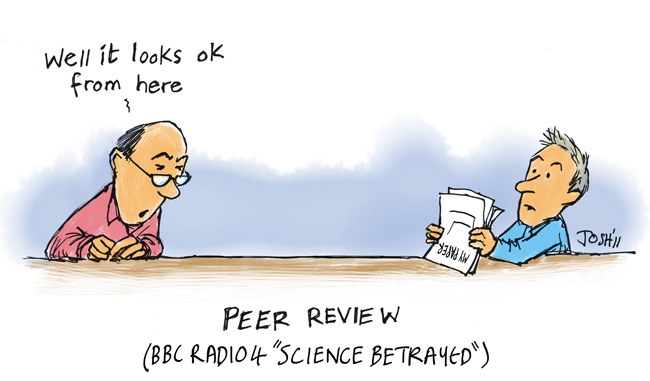Entries from March 1, 2011 - March 31, 2011
 Bishop Hill
Bishop Hill Flannery's admission
 Mar 25, 2011
Mar 25, 2011  Climate: WG3
Climate: WG3 Another remarkable interview from Andrew Bolt, this time with top CAGW guy, Tim Flannery. Bolt manages to extract the remarkable admission that nobody will know the effects of emissions cuts for a thousand years.
Flannery: Just let me finish and say this. If the world as a whole cut all emissions tomorrow the average temperature of the planet is not going to drop in several hundred years, perhaps as much as a thousand years because the system is overburdened with CO2 that has to be absorbed and that only happens slowly.
 Bishop Hill
Bishop Hill Paul Dennis on Iain Stewart
 Mar 25, 2011
Mar 25, 2011  Climate: MWP
Climate: MWP Paul Dennis posted this in the comments. It's always nice to have some opinion from an expert, and I thought it was striking enough to turn into a head post.
The Iain Stewart article posted on the Met Office website is both misleading, highly selective and largely in error in its presentation of data. Misleading in the presentation of graphics that supposedly represent the timings of mass extinction events in relation to atmospheric CO2 levels. The plot shows extinction events occuring at local maxima in CO2 levels e.g. late Cambrian, Ordovician and Devonian amongst others. The reality is that our knowledge of past CO2 levels during these times is incomplete at best and certainly lacks the resolution in both time and CO2 level to highlight local maxima.
 Bishop Hill
Bishop Hill Comments fix
 Mar 25, 2011
Mar 25, 2011  Blogs
Blogs Squarespace have now deployed a fix to deal with the commenting issue. Readers who are affected will need to clear their caches and cookies for it to take effect.
Please let me know if this doesn't have the desired effect.
 Bishop Hill
Bishop Hill Diary dates
 Mar 25, 2011
Mar 25, 2011  Royal Society
Royal Society A couple of interesting events at the Royal Society later this year:
10-11 October 2011
Warm climates of the past - a lesson for the future?
In several periods in Earth's history, climate has been significantly warmer than present. What lessons about the future can be learnt from past warm periods? The answer depends on the quality of reconstructions of past climates, our understanding of their causes, and the validity of climate models which aim to reproduce them. This meeting will address these exciting and challenging issues.
12-13 October 2011
Reconstructing and understanding CO2 variability in the past
A number of proxy methods are used to infer past atmospheric CO2 concentrations, such as fossilised leaves, paleo soils, and isotopes in ocean sediments. Each technique has its own strengths and weaknesses and methodological uncertainties. This meeting will aim to compare methods and their available records, leading to a deeper understanding of the processes which influence the proxies and the Cenozoic record of atmospheric CO2.
 Bishop Hill
Bishop Hill Stewart on geologists
 Mar 24, 2011
Mar 24, 2011  BBC
BBC  Climate: MWP
Climate: MWP  Climate: MetOffice
Climate: MetOffice  Climate: Surface
Climate: Surface Iain Stewart is best known as the guy who fronted the BBC's Climate Wars programme. Remember that?
 Where did you get that graph from?
Where did you get that graph from?
 Bishop Hill
Bishop Hill School brainwashing works
 Mar 24, 2011
Mar 24, 2011  BBC
BBC  Climate: other
Climate: other  Education
Education The BBC has just published the results of an opinion poll of schoolchildren. Asked to rank the biggest risks facing the world today, children seemed impressed by arguments for catastrophic global warming, placing it second behind terrorism, with 49% suitably scared.
I guess the relentless propaganda pumped out by schools and the BBC has had some effect.
 Bishop Hill
Bishop Hill Best keep quiet
 Mar 23, 2011
Mar 23, 2011  Climate: Surface
Climate: Surface Lots of fun is being had over the preliminary findings from the Berkelely Earth Surface Temperature project (BEST). The project team had made an announcement stating that they had processed 2% of the data through the algorithm and found the results showed warming.
 Bishop Hill
Bishop Hill Biofuels cause starvation
That's according to the head of Nestlé, the global food conglomerate:
Peter Brabeck-Letmathe, the chairman of Nestlé, lashed out at the Obama administration for promoting the use of ethanol made from corn, at the expense of hundreds of millions of people struggling to afford everyday basics made from the crop.
Mr Brabeck-Letmathe weighed in to the increasingly acrimonious debate over food price inflation to condemn politicians around the world who seem determined to blame financial speculators instead of tackling underlying imbalances in supply and demand. And he reserved especially pointed remarks for US agriculture secretary Tom Vilsack, who he said was making "absolutely flabbergasting" claims for the country's ability to cope with rising domestic and global demand for corn.
 Bishop Hill
Bishop Hill More green trashing of the environment
Also in the Telegraph, a survey of the effects of jatropha, a crop that has been pushed hard as the answer to the biofuel problem.
Jatropha has been planted across Asia in countries under pressure from the West to reduce emissions from the destruction of rainforests, car exhausts and energy production from coal-burning power plants.
But the study for the anti-poverty agency ActionAid and the RSPB of a proposed 50,000 hectare jatropha plantation development in the Dakatcha woodlands of Kenya, near Malindi, found that emissions in producing the biofuel would be 2.5 to six times higher than the fossil fuel equivalents. The woodland hosts globally endangered bird life.
A couple of years ago, as food prices soared in response to farmers diverting land to biofuels, it was argued that so-called "second generation biofuels", including jatropha, would provide an answer, because they used marginal land not required for food production.
Back to the drawing board then...
 Bishop Hill
Bishop Hill King says "Don't panic!"
 Mar 23, 2011
Mar 23, 2011  Energy
Energy Sir David King calls for calm and rational behaviour in response to Fukushima. He explains what is required:
In a serious nuclear incident, panic will win out over reason unless there is someone who is both trustworthy and informed to speak out on behalf of reason.
I don't suppose someone who splices datasets to hide declines is quite what is called for then.
 Bishop Hill
Bishop Hill Preparing the ground
 Mar 22, 2011
Mar 22, 2011  BBC
BBC  Climate: other
Climate: other Thanks to readers who have been pointing to Bob Watson's interview on the Today programme this morning, in which he spoke about the difficulty of convincing a sceptical public of the horrors of climate change in the wake of Climategate.
Audio here, starting at 51:20.
This was a boilerplate interview, reiterating a series of standard AGW talking points. To me, what was interesting about was not the content but the timing - there was no obvious newsworthiness, with Climategate having slipped off the news schedules now.
I think the reason for Watson being given airtime now is that at some point in the near future we are going to get the BBC's review of science coverage published. For some time now the BBC has been sending out signals that the report will recommend hobbling anyone who might criticise the increasingly thin case for CAGW - what Brian Cox called the "Orwellian" solution. This is quite an important departure, and it is therefore likely that Watson's appearance is the first step in a softening-up exercise.
Expect more of the same.
 Bishop Hill
Bishop Hill More unintended consequences
 Mar 21, 2011
Mar 21, 2011  Greens
Greens An excellent article in the Guardian, looking at the effects of misguided greenery on poor people, and in particular how scaremongering over GM crops is leading to massive hikes in food prices.
The continuing distaste for [genetically engineered plants] and their consequent absurd over-regulation means that the most up-to-date, environmentally benign crop protection strategies are used almost exclusively for the mega-crops that are profitable for biotech companies. The public agricultural research sector remains largely excluded from using modern molecular technology. Will this change soon? I don't think so."
H/T The Englishman.
 Bishop Hill
Bishop Hill A civil liberties post
 Mar 20, 2011
Mar 20, 2011  Civil liberties
Civil liberties Many current readers of this blog may be unaware that one of its major focuses used to be civil liberties, so I hope I will be excused a temporary reversion to this subject. The quote below is an extract from a Hansard debate last week.
Mr Bacon: What my hon. Friend has just said is really quite extraordinary. As I understand him, he is saying that a court in this country... prohibited someone from talking to a Member of Parliament and from referring to the existence of the proceedings. When one thinks of secret courts, one thinks of unsavoury regimes such as those in Burma, Cuba, Hungary in the 1950s or Stalin's Russia, but one does not think of the United Kingdom. How can a judge feel it appropriate to make an order making it unlawful-supposedly-to refer to the existence of proceedings?
Report here.





